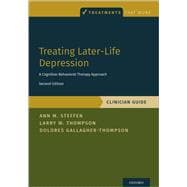As demographic trends shift toward an aging population, there is a growing need for improved mental health treatment for older adults. With depression as the leading mental health concern in later life, one of the greatest challenges for treatment providers is the wide variability of life circumstances that accompany depressive symptoms for clients across outpatient mental health, integrated primary care, and inpatient psychiatric settings.
Treating Later-Life Depression: Clinician Guide outlines culturally responsive practices that target the contexts and drivers/antecedents of depression in middle-aged and older adults. Clinicians can choose research-supported modules from the accompanying Workbook that fit the needs of their clients (i.e. chronic pain, sleep problems, anxiety, experiences of loss). This practical guide reflects continuing international scientific and clinical advances in applying CBT to age-related problems using individual and group formats, with clinician-tested recommendations for telehealth practice. With the flexible clinical tools provided in this guide, practitioners can personalize the application of change strategies, including behavioral activation, relaxation training, self-compassion, cognitive reappraisal, and communication skills training among others. Case examples are also provided from a range of disciplines (e.g., clinical psychology, psychiatry, social work, counseling, marriage and family therapy, nursing, occupational therapy and recreational specialists) to illustrate application in busy clinical practices. The guide closes with aging-friendly assessment tools and other resources to support ongoing professional development.
Treating Later-Life Depression, Clinician Guide is an indispensable resource for all behavioral health providers who wish to help diverse aging clients thrive effectively and efficiently in a daily life that is true to their values and personal strengths.








